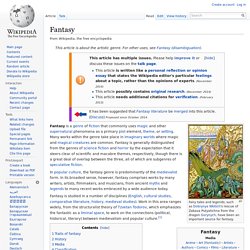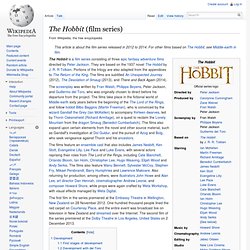

Fantasy. Fairy tales and legends, such as Dobrynya Nikitich's rescue of Zabava Putyatichna from the dragon Gorynych, have been an important source for fantasy.

In popular culture, the fantasy genre is predominantly of the medievalist form. In its broadest sense, however, fantasy comprises works by many writers, artists, filmmakers, and musicians, from ancient myths and legends to many recent works embraced by a wide audience today. Fantasy is studied in a number of disciplines (English, cultural studies, comparative literature, history, medieval studies). Work in this area ranges widely, from the structuralist theory of Tzvetan Todorov, which emphasizes the fantastic as a liminal space, to work on the connections (political, historical, literary) between medievalism and popular culture.[1] Traits of fantasy[edit] History[edit] Many works are unclear as to the belief of the authors in the marvels they contain, as in the enchanted garden from the Decameron.
Media[edit] Classification[edit] See also[edit] High fantasy. Genre overview[edit] High fantasy is defined as fantasy fiction set in an alternative, entirely fictional ("secondary") world, rather than the real, or "primary" world. The secondary world is usually internally consistent, but its rules differ in some way(s) from those of the primary world. By contrast, low fantasy is characterized by being set in the primary, or "real" world, or a rational and familiar fictional world, with the inclusion of magical elements.[1][2][3][4] Nikki Gamble distinguishes three subtypes of high fantasy:[3] Setting[edit] In some fiction, a contemporary, "real-world" character is placed in the invented world, sometimes through framing devices such as portals to other worlds or even subconscious travels. High fantasy worlds may be more or less closely based on real world milieux, or on legends such as the Arthurian Cycle.
Characters[edit] Many high fantasy storylines are told from the viewpoint of one main hero. Good versus evil[edit] Tolkien Wikipedia Pages. JRR Tolkien Reads The One Ring Poem. The Hobbit. THE HOBBIT: AN UNEXPECTED JOURNEY. Martin Freeman. Richard Armitage. The Hobbit (film series) The Hobbit is a film series consisting of three epic fantasy adventure films directed by Peter Jackson.

They are based on the 1937 novel The Hobbit by J. R. R Tolkien. Portions of the trilogy are also adapted from the appendices to The Return of the King. The films are subtitled An Unexpected Journey (2012), The Desolation of Smaug (2013), and There and Back Again (2014). The first film in the series premiered at the Embassy Theatre in Wellington, New Zealand on 28 November 2012. Peter Jackson and Fran Walsh originally expressed interest in filming The Hobbit in 1995, then envisaging it as part one of a trilogy (part two would have been based on The Lord of the Rings). On 16 December 2007, New Line and MGM announced that Jackson would be executive producer of The Hobbit and its sequel. Guillermo del Toro was originally set to direct the film, but left because of ongoing delays.
The first film will stand on its own and the second will be a transition and fusion with Peter's world. The Lord of the Rings. How Lord of The Rings Should Have Ended. J.K.Rowling Official Site - Harry Potter and more. Harry Potter in 99 Seconds. Pottermore: a unique online Harry Potter experience from J.K. Rowling. MuggleNet. Wiki. George R. R. Martin's Official Website. Game of Thrones: Homepage. Westeros: The 'A Song of Ice and Fire' Domain. Cooking Ice and Fire - Home. HBO - Making Game of Thrones.